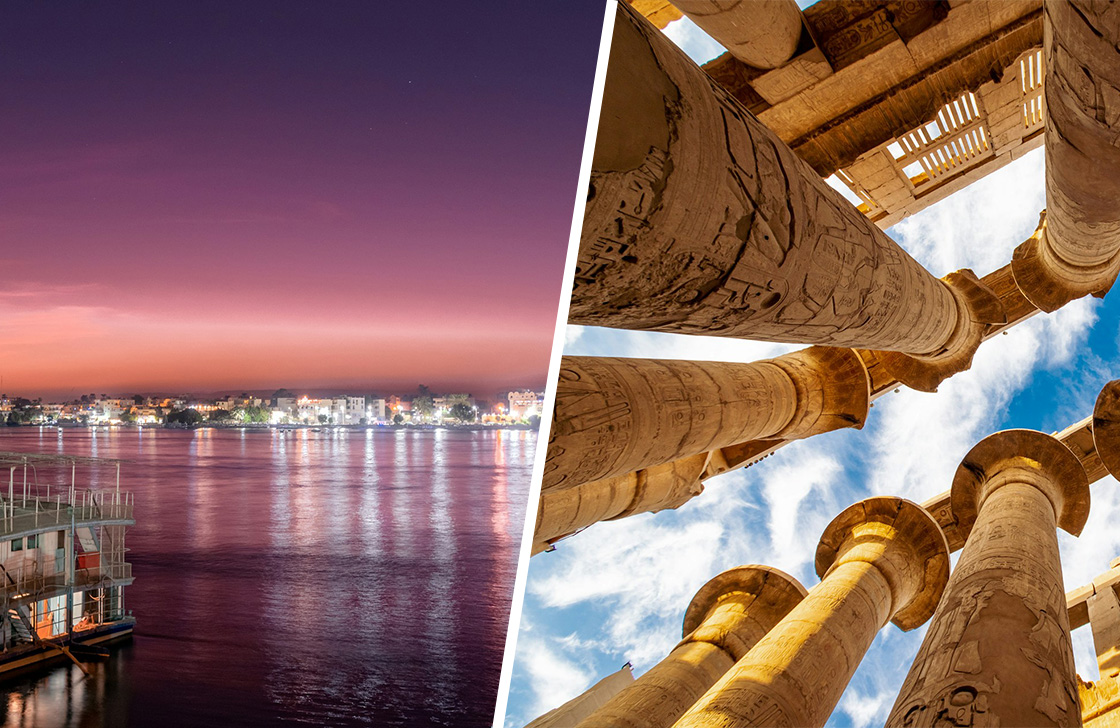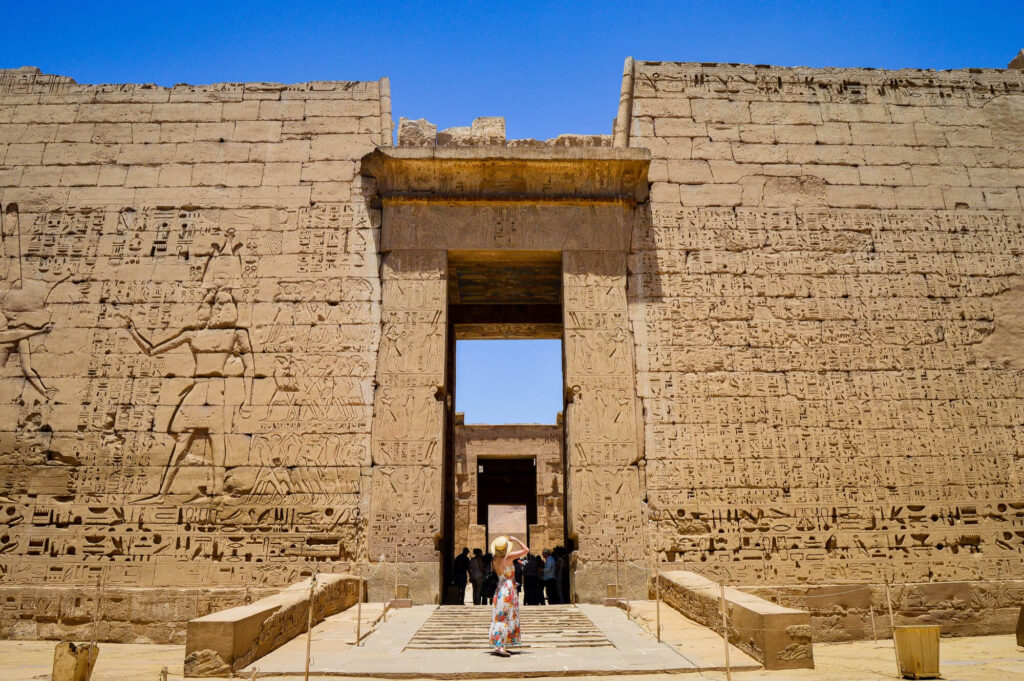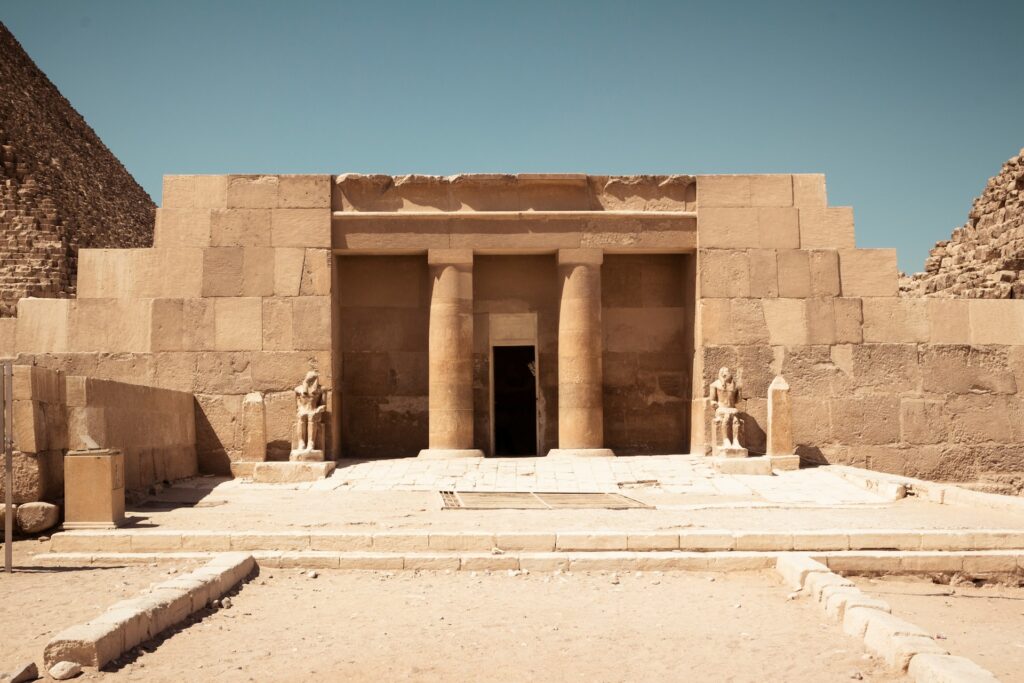The Ultimate Guide to Lake Nasser Cruise In 2025
1 February 2024

Located in southern Egypt, Lake Nasser is a captivating marvel that has become a popular destination for travellers seeking unique experiences. This expansive body of water, often called Egypt’s largest artificial lake, stretches across 5,250 square kilometres. Created as a result of the construction of the Aswan High Dam on the Nile River, the Lake Nasser Cruise offers visitors an awe-inspiring blend of natural beauty and historical significance.
One of the primary reasons why Lake Nasser is worth exploring is its sheer magnificence. The tranquil waters are surrounded by breathtaking desert landscapes and towering sandstone cliffs contrasting sharply against the azure sky. The pristine environment provides a serene setting for relaxation and reflection.
Beyond its natural allure, Lake Nasser also boasts a rich historical heritage. Several ancient temples were relocated and saved from being submerged during the dam’s construction, adding an element of intrigue to this already captivating destination. Among these temples is Abu Simbel, one of Egypt’s most renowned archaeological sites featuring colossal statues carved into rock faces.
The unique combination of the Lake Nasser Cruise’s natural beauty and cultural significance makes it a must-see destination in Egypt.
The Top Attractions of Lake Nasser Cruises
Lake Nasser offers a captivating experience for travellers seeking a different perspective on the country’s ancient wonders. One of the best ways to explore this vast reservoir is through a Cruise on Lake Nasser, which allows visitors to discover the top attractions and highlights along its shores.

Kalabsha Temple
Located on the banks of Lake Nasser, the Kalabsha Temple stands as a remarkable testament to ancient Egyptian history. Also known as the Temple of Mandulis, Kalabsha Temple is one of the many treasures left behind by the mighty pharaohs.
The Kalabsha Temple boasts an impressive architectural design showcasing ancient Egyptian builders’ skill and craftsmanship. Its grandeur is evident in its towering columns, intricate carvings, and detailed reliefs depicting scenes from mythology and daily life.
Historically significant, this temple was situated initially in Lower Nubia but was relocated to its current location during the construction of the Aswan High Dam. It was carefully dismantled and reconstructed piece by piece to preserve its cultural heritage.
For enthusiasts of ancient civilisations or those simply seeking a deeper understanding of Egypt’s rich past, visiting Kalabsha Temple is an absolute must. It is a testament to Egypt’s storied past and continues to mesmerise tourists with its ageless allure and historical importance.
Abu Simbel Temples
The Abu Simbel Temples, located on the western bank of Lake Nasser in Egypt, are a UNESCO World Heritage Site and a testament to the incredible engineering feats of ancient civilisations. During the rule of Pharaoh Ramses II in the 13th century BC, these temples were constructed and continue to impress visitors with their grandeur and historical importance.
The Abu Simbel Temples consist of two main structures: the Great and the smaller Temple of Hathor. The Great Temple, dedicated to Ramses II himself, is particularly awe-inspiring. Its facade features four colossal statues of Ramses II seated on thrones, each standing at an impressive height of over 65 feet. The intricate wall carvings and hieroglyphics relay tales of military conquests and religious tenets through their intricate designs.
What makes these temples even more remarkable is their relocation in the 1960s. In an unprecedented effort led by UNESCO, both temples were carefully dismantled and relocated higher up on an artificial hill. This engineering feat ensured their preservation for future generations to admire.
The temples not only showcase Ramses II’s legacy but also serve as a reminder of humanity’s ability to overcome challenges through innovation and determination.
Temple of Amada
The Temple of Amada is significant in ancient Egyptian art and architecture history. Located on the Lake Nasser Cruise route, it is renowned as the oldest structure in this area.
Built during the reign of Pharaoh Thutmose III, the temple showcases remarkable examples of Egyptian architectural techniques and artistic styles from that era. Its construction dates back to approximately 1450 BC, over three millennia old. The temple boasts impressive wall reliefs and carvings that depict scenes from ancient Egyptian mythology and religious rituals.
Visitors are granted access to this ancient site, allowing them to admire its impressively preserved architectural elements, including its symmetrical courtyards and holy spaces. The temple’s unique location on Lake Nasser adds to its allure, offering a serene atmosphere for those discovering its secrets.

Wadi El-Seboua
Nestled on the shores of Lake Nasser, the Wadi El-Seboua temples stand as hidden gems in the vast desert landscape of Egypt. Dating back to the 13th century BC, the temples offer a captivating glimpse into ancient Egypt’s rich history and architectural marvels.
Located along the popular Lake Nasser Cruise route, Wadi El-Seboua is often overshadowed by its more famous counterparts, such as Abu Simbel and Philae Temple. The temples of Wadi El-Seboua were built during the reign of Ramses II and are dedicated to various Egyptian deities. The grandeur and intricacy of their design showcase the mastery of ancient Egyptian craftsmanship.
The serene desert surroundings of Wadi El-Seboua create an atmosphere of tranquillity that allows visitors to appreciate the magnificence of these ancient structures truly. As you wander through the temple complex, you will be awestruck by its enormity and breathtaking beauty.
While Wadi El-Seboua may not be as well-known as other tourist destinations in Egypt, it is gaining recognition among travellers seeking a more off-the-beaten-path experience. Its remote location adds to its appeal, offering a sense of discovery for those who venture here.
Qasr Ibrim
Qasr Ibrim, located on a hilltop overlooking the Nile River in Egypt, is an extraordinary archaeological site that offers a glimpse into the rich history of ancient Nubia. This lofty stronghold has served as a testament to the enduring legacy of civilisation, having been a crucial factor in forming the area’s cultural identity.
Dating back to the Pharaonic period, Qasr Ibrim has been inhabited continuously for over 3,000 years. Due to its commanding position, it served as an important strategic location, offering both protection and control over trade routes along the Nile.
What makes Qasr Ibrim genuinely remarkable is its preservation. Unlike many other archaeological sites in Egypt, modern restoration efforts largely left this hilltop citadel untouched. It allows visitors to experience an authentic glimpse into ancient Nubian life.
Every step reveals new insights into this captivating civilisation, from deciphering hieroglyphics on temple walls to marvelling at intricate carvings and frescoes. As you wander through the ruins of Qasr Ibrim, you can’t help but feel connected to those who once called this place home.
The echoes of history resonate through every stone and offer a unique perspective on the legacy left behind by these ancient civilisations.
Tips for Planning a Cruise on Lake Nasser
Planning a cruise on Lake Nasser can be a thrilling and unforgettable adventure. To make the most of your trip, carefully consider a few essential factors beforehand. Firstly, you will want to explore the different cruise duration options available. Lake Nasser cruises typically range from three to seven nights, allowing you to choose the itinerary that best suits your preferences and time constraints.
Next, it is essential to determine the best time to visit Lake Nasser for your cruise.
The climate in this region can vary significantly throughout the year. Understanding the weather patterns will help you select when temperatures are comfortable and rainfall is minimal. Additionally, specific periods may offer unique opportunities for wildlife sightings or cultural events along the lake’s shores.
When selecting a cruise ship, it is crucial to research and compare facilities and amenities offered by different operators. Consider cabin comfort, dining options, onboard activities, and additional services or entertainment during the voyage. This will help ensure your onboard experience meets your expectations and enhances overall trip enjoyment.
By considering these tips when planning your Cruise on Lake Nasser experience, you can maximize your enjoyment of this stunning destination while creating memories that will last a lifetime.
Choosing the Right Lake Nasser Cruise: Tips and Recommendations
Cruise Type
One of the first decisions is whether you prefer a luxury or budget cruise experience. Luxury cruises offer top-notch amenities, gourmet dining options, and spacious cabins. In contrast, budget cruises provide a more affordable option with more straightforward accommodations and dining choices.
Cruise Duration
Lake Nasser cruises typically last three to seven nights, allowing you to choose a timeframe that suits your schedule and preferences. Shorter cruises may focus on specific lake highlights, while longer ones offer more comprehensive exploration.
Onboard Facilities
Some cruises provide swimming pools, spas, fitness centres, and entertainment options such as live music or cultural performances. Others may have more basic facilities but still offer comfortable and enjoyable experiences.
Considering these factors, you can make an informed decision when choosing the right Lake Nasser cruise that best suits your preferences and ensures an unforgettable experience on this stunning Egyptian lake.
Lake Nasser Cruise Itinerary and Activities
Lake Nasser Cruises offers travellers a unique and unforgettable experience exploring Egypt’s beauty and cultural heritage. With its serene waters and stunning landscapes, Lake Nasser provides the perfect backdrop for a memorable journey.
The Lake Nasser Cruise itinerary typically includes visits to iconic landmarks such as Abu Simbel, Kalabsha Temple, and Wadi El Seboua. The ancient ruins of Egypt provide a captivating glimpse into the country’s storied past and architectural wonders.
Apart from sightseeing activities, a Cruise on Lake Nasser also offers opportunities for cultural experiences. Travellers can interact with local communities along the lake, gaining insights into their traditions, customs, and way of life. This cultural immersion adds depth to the overall experience, allowing visitors to develop a deeper appreciation for Egypt’s diverse heritage.
On the Lake Nasser Cruise, passengers can indulge in luxurious accommodations and savour exquisite cuisine, blending traditional Egyptian flavours with international influences. In addition to relaxing on the deck and taking in live entertainment in the evenings, various onboard amenities enhance one’s leisure experience.
Overall, embarking on a Lake Nasser cruise guarantees an enchanting journey filled with breathtaking sights, enriching cultural encounters, and moments of relaxation. This serene and picturesque lake in Egypt offers an unexplored adventure for intrepid travellers seeking a tranquil escape from the usual tourist trail.
So why not embark on this extraordinary adventure and discover the hidden gems of Lake Nasser?
Frequently Asked Questions (FAQs)
How should I dress for a Nile Cruise?
Dressing comfortably is critical, especially in light, breathable fabrics. While casual wear is acceptable on the cruise ship, it’s advisable to dress modestly when visiting religious or historical sites. Sunscreen, a hat, and comfortable walking shoes are also essential for excursions. Evenings may be more relaxed, so a light jacket or shawl is recommended.
What facilities can I expect on a Lake Nasser Cruise ship?
Lake Nasser Cruise ships are well-equipped with modern amenities to ensure a comfortable journey for passengers. Most ships feature spacious cabins with en-suite bathrooms, restaurants serving delicious meals, onboard entertainment options, swimming pools, sun decks for relaxation, and knowledgeable guides to provide historical insights during shore excursions.
How can one book a Nile Cruise, and what’s included in the package?
Booking a Nile Cruise can be done through travel agencies, online platforms, or cruise operators. Packages typically include accommodation, meals, guided excursions to historical sites, and entertainment onboard. It’s essential to check the specific details of each package, as some may also include airport transfers, gratuities, or optional add-ons for a more customised experience.
How is the food and accommodation on the Nile cruise ship?
Nile cruise ships typically offer comfortable accommodations and a variety of dining options. Most cruises include buffet-style meals with a mix of international and Egyptian cuisine. The onboard experience aims to provide a pleasant and convenient stay, allowing passengers to unwind after a day of exploration along the Nile.
Is journeying on a Nile cruise suitable for all ages?
Yes, Nile cruises are generally suitable for all ages. They provide a comfortable and relaxed way to explore Egypt’s historical treasures, making them accessible to young and old travellers. However, individuals with specific health concerns should consult with their healthcare providers before embarking on such a journey.







